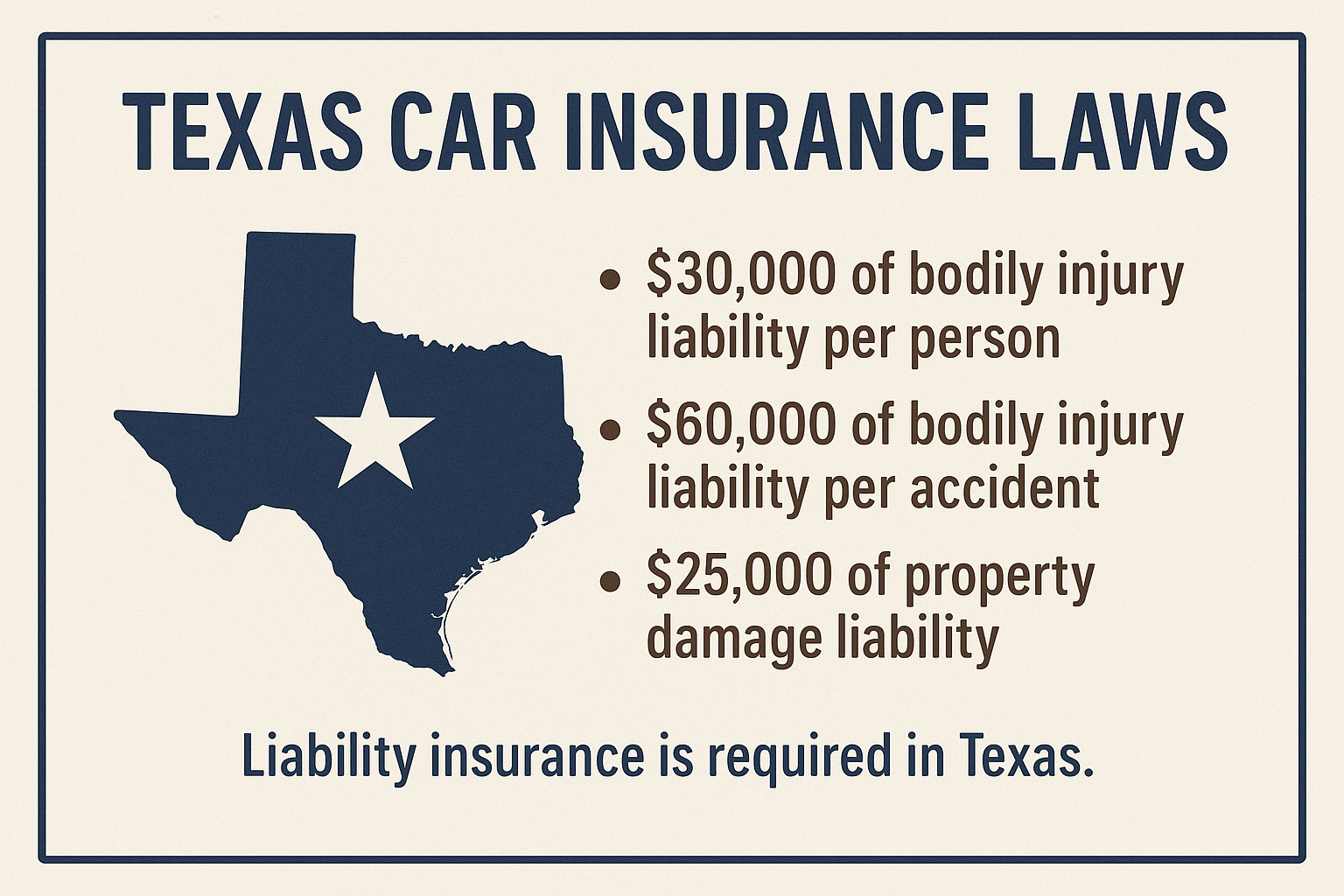Car insurance laws in Texas can seem confusing at first, but understanding them is crucial for every driver. In Texas, the law aims to protect drivers, passengers, and anyone else who might be affected by a car accident. Knowing what is required not only keeps you legal but also helps you make wise choices about your coverage. Because driving without proper insurance can lead to serious problems, it pays to stay informed. If you’re a new driver or just new to Texas, you might wonder what you really need. Fortunately, the basics are easy to grasp if you break them down. Learning about Texas car insurance will give you confidence on the road. By reading on, you will soon understand the rules and the reasons behind them.
Introduction to Car Insurance Requirements in Texas
Every driver in Texas must have car insurance by law. The state requires all vehicles to be insured before they can hit the road. You cannot register your car or renew your registration without showing proof of insurance. Police officers may ask for your insurance card during a traffic stop or after a crash. If you fail to provide it, you could face immediate penalties. Keeping your insurance information in your car at all times is a smart habit.
Texas law asks explicitly for liability insurance. Liability insurance covers damages you cause to other people or their property in an accident. Even if you believe you are a careful driver, accidents can still happen unexpectedly. When you are found at fault in an accident, your liability coverage steps in to pay for the other person’s losses. This legal requirement ensures that if someone suffers because of your driving, they are not left with the bill. It also gives peace of mind to everyone sharing the road.
Proof of insurance is more than a card; it represents your commitment to responsible driving. Texas authorities regularly check for compliance, using both roadside checks and electronic systems. If you do not have insurance, you risk fines, license suspension, or even having your car impounded. Since insurance is a legal requirement, you should always make sure your policy is up to date. By following the law, you protect yourself and others every time you drive.
Why Liability Coverage Matters for Texas Drivers
Liability coverage is the foundation of car insurance in Texas. It pays for injuries or property damage you might cause to others in an accident. Since Texas uses an “at-fault” system, the driver responsible for the accident must pay for the costs. Without liability insurance, you would have to pay these expenses out of your own pocket. Many drivers cannot afford such unexpected bills, so insurance becomes essential for financial protection.
Accidents can lead to high medical bills and costly car repairs. One small mistake on the road can affect another family’s well-being. Through liability coverage, victims can recover their losses more easily, which makes the recovery process smoother for everyone. Because Texas requires this coverage, people can feel safer knowing that drivers share the responsibility of paying for accidents. If you cause an accident, your insurance will handle the payments up to your coverage limits.
Besides meeting legal requirements, liability coverage helps you avoid serious financial trouble. If you do not have insurance and cause an accident, you could face lawsuits and wage garnishment. Taking time to understand your policy and limits helps you stay prepared for the unexpected. By maintaining liability coverage, you show respect for the law and for fellow drivers. It is a simple step that brings lasting safety and security to Texas roads.
Exploring Minimum Coverage Limits Under Texas Law
Texas sets clear minimums for liability coverage that every driver must carry. The state refers to these limits as “30/60/25.” These numbers mean $30,000 for injuries per person, $60,000 total for injuries per accident, and $25,000 for property damage per accident. Although these numbers may seem high, serious accidents can easily cost even more. Meeting these minimums keeps you legally compliant, but it does not always cover every possible expense.
Minimum coverage provides basic protection, but you should remember that costs from a nasty crash can quickly exceed these amounts. For example, if you cause a multi-car accident or seriously injure someone, medical and repair bills might soar above your policy limits. When that happens, you are responsible for paying the difference out of your own pocket. Because of this risk, many drivers choose to purchase higher coverage levels.
Knowing the limits helps you make informed decisions about your insurance. You must always meet or exceed the state minimums, but you can choose to increase your coverage for added peace of mind. Many insurance agents recommend higher limits, especially if you own valuable assets. Increasing your protection often costs only a little more each month. Balancing your budget and your need for security is the key to safe and smart driving in Texas.
Additional Car Insurance Options You Should Know
Texas law only requires liability insurance, but many drivers choose extra coverage for added protection. Collision coverage, for example, pays for repairs to your own car after an accident, even if you caused it. Comprehensive coverage handles non-collision damages, such as theft, fire, or weather events. Having both types can save you from considerable out-of-pocket costs if something unexpected happens to your vehicle.
Uninsured and underinsured motorist coverage can also be a wise choice. Some drivers on Texas roads may not have insurance, even though it is illegal. If such a driver hits you, your extra coverage will help pay for your injuries or car repairs. Medical payments coverage and personal injury protection can also help with hospital bills and lost wages, no matter who caused the accident. These options give you more complete protection when life takes an unexpected turn.
When choosing extra coverage, consider your car’s value and your financial situation. Older cars might not need collision or comprehensive coverage, especially if repair costs are higher than the car’s worth. However, newer or more expensive vehicles usually benefit from more protection. It is always helpful to talk to an insurance agent about your needs. By reviewing your options carefully, you can build a policy that fits your life in Texas.
Consequences of Not Following Texas Insurance Laws
Driving without the required insurance in Texas leads to serious consequences. Police can issue a ticket and charge you a hefty fine if you cannot show proof of insurance during a stop. The first offense usually results in a fine, but repeat offenses lead to even higher costs. In some cases, your car could be impounded until you provide proof of insurance. These penalties create lasting headaches for drivers who ignore the law.
Beyond fines and impoundment, lacking insurance can impact your ability to drive legally. Texas may suspend your driver’s license and registration if you cannot prove you have insurance. Restoring your driving privileges often involves extra fees and paperwork. Insurance companies may also charge higher rates if you have a history of driving without coverage. Because these penalties add up quickly, it is never worth the risk to drive uninsured.
Financial risks grow even greater if you cause an accident without insurance. You would have to pay all the medical bills, car repairs, and legal costs yourself. People can sue you for damages, putting your income and property at risk. The stress and financial burden could last for years. Choosing to follow Texas insurance laws is not just about avoiding penalties, but also about protecting your future and your family’s well-being.
Making Smart Choices When Choosing Your Coverage
Choosing the right car insurance means more than just meeting the minimum legal requirements. While it is essential to follow the law, you should think about your personal needs and financial goals. Evaluate how much you drive, the value of your car, and your comfort with risk. For many people, paying a little more each month for better coverage is a sound investment. You do not want to find yourself unprotected when an accident happens.
Comparing quotes from different insurance companies helps you find the best deal. Many insurers offer discounts for safe drivers, students, or people with multiple policies. When you shop around, you can tailor your coverage to fit your budget and lifestyle. Talking to an experienced insurance agent also gives you insights into the options that work best for you. Reliable advice makes it easier to understand the fine print and avoid hidden surprises.
Review your policy regularly to make sure it still meets your needs. Life changes such as buying a house, getting married, or adding a teen driver can affect your insurance needs. Keeping your coverage up to date means you always have the proper protection. Staying informed about Texas laws and insurance products ensures you drive with confidence. Wise choices bring peace of mind on every journey.
Conclusion
Understanding car insurance laws in Texas is not just about following rules, but about protecting yourself and everyone else on the road. Insurance requirements may look simple on the surface, but the choices you make have a lasting impact on your financial security and peace of mind. By learning about liability coverage, minimum limits, and available options, you take control of your own safety. Because driving comes with risks, it is smart to prepare for the unexpected. Fines, license suspension, and personal lawsuits are just a few of the problems uninsured drivers can face. By following the law and staying up to date with your policy, you avoid unnecessary stress and loss. Choosing extra coverage where needed helps you recover quickly if an accident happens. While meeting legal requirements is essential, customizing your policy gives you the best protection possible. Talk to insurance professionals, compare your options, and always keep your needs in mind. With the proper knowledge and a little effort, you can drive confidently, knowing you are covered in every situation.

